
Keith Rupert Murdoch is an Australian-born American business magnate, investor, and media proprietor. Through his company News Corp, he is the owner of hundreds of local, national, and international publishing outlets around the world, including in the UK, in Australia, in the US, book publisher HarperCollins, and the television broadcasting channels Sky News Australia and Fox News. He was also the owner of Sky, 21st Century Fox, and the now-defunct News of the World. With a net worth of US$21.7 billion as of 2 March 2022, Murdoch is the 31st richest person in the United States and the 71st richest in the world according to Forbes magazine.

The Times is a British daily national newspaper based in London. It began in 1785 under the title The Daily Universal Register, adopting its modern name on 1 January 1788. The Times and its sister paper The Sunday Times, are published by Times Media, since 1981 a subsidiary of News UK, in turn wholly owned by News Corp. The Times and The Sunday Times, which do not share editorial staff, were founded independently and have had common ownership only since 1966. In general, the political position of The Times is considered to be centre-right.

The original incarnation of News Corporation was an American multinational mass media corporation controlled by media mogul Rupert Murdoch and headquartered at 1211 Avenue of the Americas in New York City. Prior to its split in 2013, it was the world's largest media company in terms of total assets and the world's fourth largest media group in terms of revenue. It had become a media powerhouse since its inception, dominating the news, television, film, and print industries.
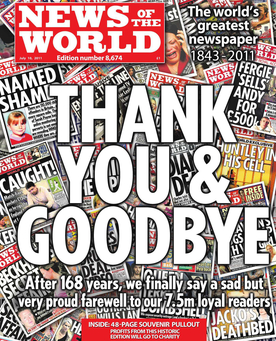
The News of the World was a weekly national "red top" tabloid newspaper published every Sunday in the United Kingdom from 1843 to 2011. It was at one time the world's highest-selling English-language newspaper, and at closure still had one of the highest English-language circulations. It was originally established as a broadsheet by John Browne Bell, who identified crime, sensation and vice as the themes that would sell most copies. The Bells sold to Henry Lascelles Carr in 1891; in 1969, it was bought from the Carrs by Rupert Murdoch's media firm News Limited. Reorganised into News International, a subsidiary of News Corporation, the newspaper was transformed into a tabloid in 1984 and became the Sunday sister paper of The Sun.

News Corp UK & Ireland Limited is a British newspaper publisher, and a wholly owned subsidiary of the American mass media conglomerate News Corp. It is the current publisher of The Times, The Sunday Times, and The Sun newspapers; its former publications include the Today, News of the World, and The London Paper newspapers. It was established in February 1981 under the name News International plc. In June 2002, the company name was changed to News International Limited, and on 31 May 2011, to NI Group Limited, and on 26 June 2013 to News UK.

The Australian, with its Saturday edition The Weekend Australian, is a broadsheet newspaper published by News Corp Australia since 14 July 1964. As the only Australian daily newspaper distributed nationally, its readership as of September 2019 of both print and online editions was 2,394,000. Its editorial line has been self-described over time as centre-right.

William John Biffen, Baron Biffen,, was a British Conservative Party politician. He was a member of parliament from 1961 to 1997, and served in Margaret Thatcher's cabinet; he then served in the House of Lords.
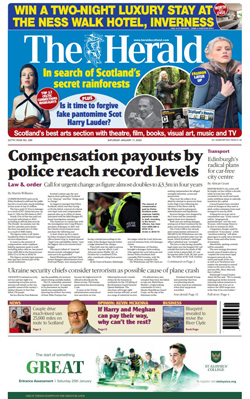
The Herald is a Scottish broadsheet newspaper founded in 1783. The Herald is the longest running national newspaper in the world and is the eighth oldest daily paper in the world. The title was simplified from The Glasgow Herald in 1992. Following the closure of the Sunday Herald, the Herald on Sunday was launched as a Sunday edition on 9 September 2018.
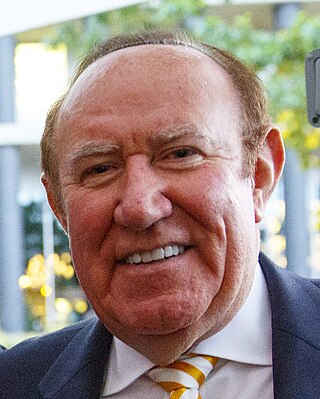
Andrew Ferguson Neil is a British journalist and broadcaster who is chairman of The Spectator. He was editor of The Sunday Times from 1983 to 1994. He has presented various political programmes on the BBC and on Channel 4.

Sir Harold Matthew "Harry" Evans was a British-American journalist and writer. In his career in his native Britain, he was editor of The Sunday Times from 1967 to 1981, and its sister title The Times for a year from 1981, before being forced out of the latter post by Rupert Murdoch. While at The Sunday Times, he led the newspaper's campaign to seek compensation for mothers who had taken the morning sickness drug thalidomide, which led to their children having severely deformed limbs.
News Corp Australia is an Australian media conglomerate and wholly owned subsidiary of the American News Corp.
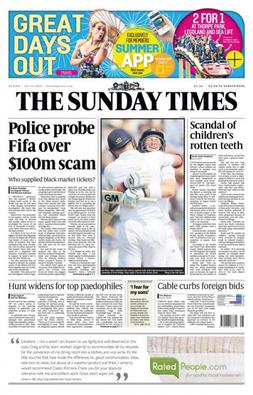
The Sunday Times is a British Sunday newspaper whose circulation makes it the largest in Britain's quality press market category. It was founded in 1821 as The New Observer. It is published by Times Newspapers Ltd, a subsidiary of News UK, which is owned by News Corp. Times Newspapers also publishes The Times. The two papers, founded separately and independently, have been under the same ownership since 1966. They were bought by News International in 1981.
Charles Cospatrick Douglas-Home was a Scottish journalist who served as editor of The Times from 1982 until his death.
Evan Whitton was an Australian journalist.
Frank Thomas Robertson Giles was an English journalist, historian and diplomat, who was editor of the British Sunday Times newspaper from 1981 to 1983, having served as its foreign editor (1961–1977) and then deputy editor (1967–1981) under his predecessor Harold Evans. He stood down in the wake of the Hitler Diaries scandal.
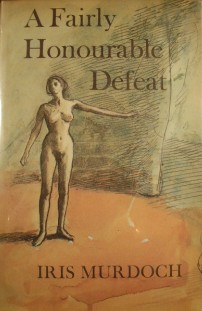
A Fairly Honourable Defeat is a novel by the British writer and philosopher Iris Murdoch. Published in 1970, it was her thirteenth novel.
Shayne Currie is a New Zealand journalist. Currie is the editor of The New Zealand Herald newspaper, an Auckland-based newspaper with the highest circulation of any newspaper in the country.
Allan Hall was a British journalist.

The Sun is a British tabloid newspaper, published by the News Group Newspapers division of News UK, itself a wholly owned subsidiary of Lachlan Murdoch's News Corp. It was founded as a broadsheet in 1964 as a successor to the Daily Herald, and became a tabloid in 1969 after it was purchased by its current owner. The Sun had the largest daily newspaper circulation in the United Kingdom, but was overtaken by freesheet rival Metro in March 2018.

The News International phone hacking scandal was a controversy involving the now-defunct News of the World and other British newspapers owned by Rupert Murdoch. Employees of the newspaper engaged in phone hacking, police bribery, and exercising improper influence in the pursuit of stories.














